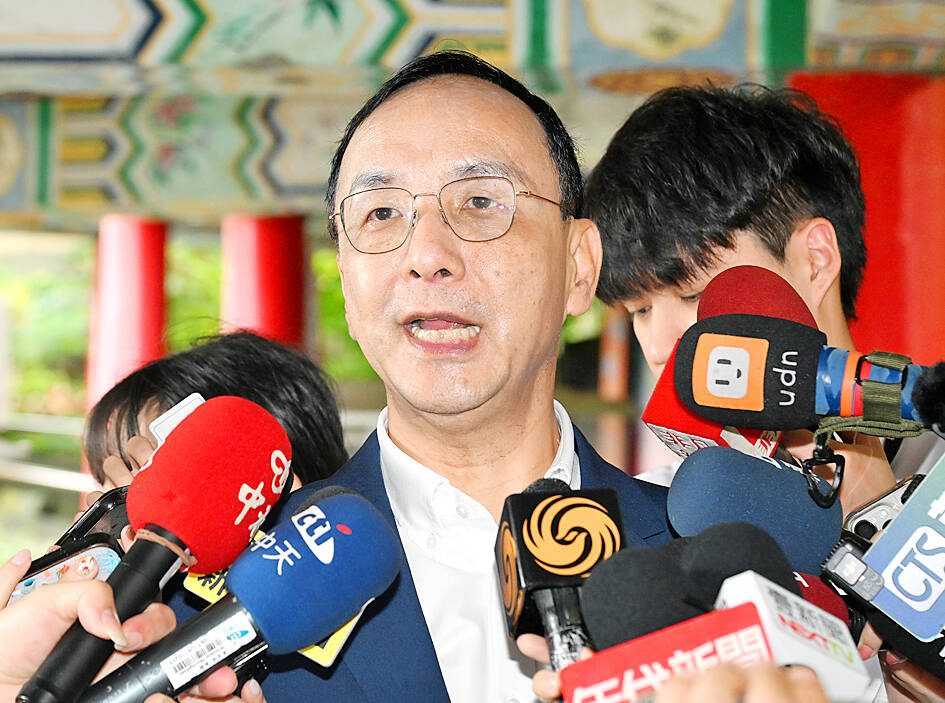Neither Chinese Nationalist Party (KMT) Chairman Eric Chu (朱立倫) nor his Taiwan People’s Party (TPP) counterpart Huang Kuo-chang (黃國昌) has confirmed their participation in a national security briefing called by the Presidential Office next week.
Speaking separately with media yesterday, both leaders said they needed more information before deciding whether to attend.
“The information [we have] right now remains confusing and vague,” Huang told a news conference in Taipei, adding that he did not even know the agenda or whether President William Lai (賴清德) would attend in person.

Photo: Liao Chen-huei, Taipei Times
He said that while the TPP had responded positively to Lai’s proposal, made during a speech marking the first anniversary of his inauguration, he was now concerned whether such a meeting would be just a briefing from one side, rather than an exchange of views between different parties.
Chu expressed the same concern when he spoke with reporters during a temple visit in Taipei.
The planned meeting “should not be a one-way lecture from the president,” but rather a mutual discussion covering a range of national security issues, including defense, the economy and energy, Chu said.
Presidential Office Secretary-General Pan Men-an (潘孟安) called KMT and TPP representatives on Thursday to discuss the planning of the proposed briefing on Wednesday next week, Presidential Office spokesperson Karen Kuo (郭雅慧) said.
Kuo expressed hope that the opposition leaders would accept the invitation, adding that this would be the first time the Presidential Office holds a national security briefing specifically for the opposition.
She did not disclose what was discussed during Pan’s phone calls or provide any specific details on the planning of the proposed briefing.
During his speech on May 20, Lai urged leaders across party lines to “prioritize our nation’s interests and uphold our nation’s security,” adding that “grounded in shared facts, we can openly and honestly exchange views and discuss matters of national importance” and “tackle our nation’s challenges side by side.”

Taiwanese were praised for their composure after a video filmed by Taiwanese tourists capturing the moment a magnitude 7.5 earthquake struck Japan’s Aomori Prefecture went viral on social media. The video shows a hotel room shaking violently amid Monday’s quake, with objects falling to the ground. Two Taiwanese began filming with their mobile phones, while two others held the sides of a TV to prevent it from falling. When the shaking stopped, the pair calmly took down the TV and laid it flat on a tatami mat, the video shows. The video also captured the group talking about the safety of their companions bathing

US climber Alex Honnold is to attempt to scale Taipei 101 without a rope and harness in a live Netflix special on Jan. 24, the streaming platform announced on Wednesday. Accounting for the time difference, the two-hour broadcast of Honnold’s climb, called Skyscraper Live, is to air on Jan. 23 in the US, Netflix said in a statement. Honnold, 40, was the first person ever to free solo climb the 900m El Capitan rock formation in Yosemite National Park — a feat that was recorded and later made into the 2018 documentary film Free Solo. Netflix previewed Skyscraper Live in October, after videos

Starting on Jan. 1, YouBike riders must have insurance to use the service, and a six-month trial of NT$5 coupons under certain conditions would be implemented to balance bike shortages, a joint statement from transportation departments across Taipei, New Taipei City and Taoyuan announced yesterday. The rental bike system operator said that coupons would be offered to riders to rent bikes from full stations, for riders who take out an electric-assisted bike from a full station, and for riders who return a bike to an empty station. All riders with YouBike accounts are automatically eligible for the program, and each membership account

A classified Pentagon-produced, multiyear assessment — the Overmatch brief — highlighted unreported Chinese capabilities to destroy US military assets and identified US supply chain choke points, painting a disturbing picture of waning US military might, a New York Times editorial published on Monday said. US Secretary of Defense Pete Hegseth’s comments in November last year that “we lose every time” in Pentagon-conducted war games pitting the US against China further highlighted the uncertainty about the US’ capability to intervene in the event of a Chinese invasion of Taiwan. “It shows the Pentagon’s overreliance on expensive, vulnerable weapons as adversaries field cheap, technologically